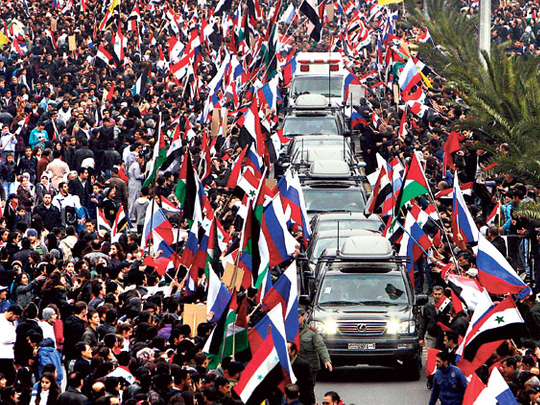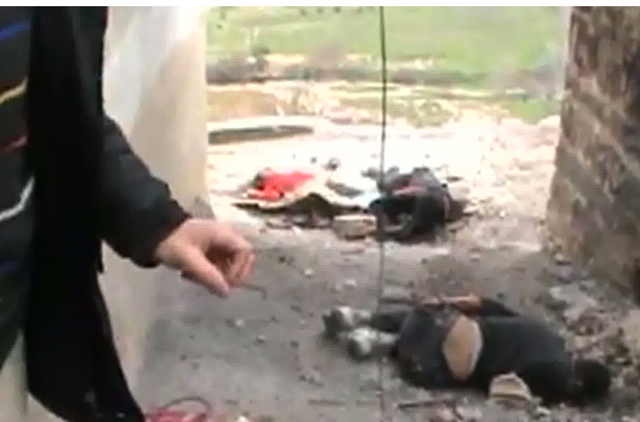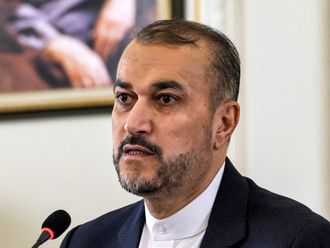
Dubai: The six-member Gulf Cooperation Council (GCC) Tuesday announced the recall of its ambassadors from Damascus and decided to expel Syrian envoys in response to escalating violence in the troubled country.
Damascus had rejected Arab attempts to "solve this crisis and prevent the bloodshed of the Syrian people," a GCC statement said. "The council considers that it is necessary for the Arab states ... to take every decisive measure faced with this dangerous escalation against the Syrian people. Nearly a year into the crisis, there is no glint of hope of a solution."
The GCC foreign ministers will meet in Riyadh on Saturday to discuss the situation in Syria.
The GCC action, Dr Samir Taqi, head of the Dubai-based Orient Research Centre, said is a great setback in relations between the Bashar Al Assad regime and what used to be strong allies of the country.
He said the burden of this move lies on the regime and will strip it of regional legitimacy. "It comes after the regime slammed the doors on the Arab League initiative to resolve the bloody conflict," Dr Taqi said.
"I don't think that the move will entail the GCC recognition of the Syrian National Council, but it will help the revolution."
Europe, meanwhile, stepped up pressure on Syria with several nations recalling their ambassadors and the EU considering new sanctions to cut the regime's access to funds.
France, Italy, Spain and the Netherlands decided to bring back their envoys for consultations, joining Britain and Belgium to protest the regime's relentless crackdown. The US has also closed its embassy.
The developments came as Russian Foreign Minister Sergei Lavrov said after talks with Al Assad in Damascus that the Syrian leader was "fully committed" to ending the bloodshed.
"We [Russia] confirmed our readiness to act for a rapid solution to the crisis based on the plan put forward by the Arab League," he said.
The Russian minister, who received an enthusiastic public reception as he arrived in Syria, said he believed that the Al Assad regime had heard Moscow's message, but did not elaborate.
Dr Taqi, however, said the unprecedented reception was an attempt by Al Assad's regime to pre-empt any Russian move proposing that Al Assad step down.
"Al Assad wants his guest to feel that he is still popular among his people and that the maximum he could offer is a dialogue with the opposition."
Lavrov stressed Al Assad wanted the Arab League observer mission, which was suspended last month amid a spike in violence, to continue its work and even expand, describing it as a "stabilising factor".
He said Syria will also announce the schedule for holding a referendum on constitutional reforms.
He also said Al Assad was ready for dialogue with all parties. "It's clear that efforts to stop violence should be accompanied by the start of dialogue between all the political forces."
Turkey plans new initiative
Ankara: Turkey is preparing a new initiative with countries opposing the Syrian government and its bloody crackdown on protesters, Prime Minister Tayyip Erdogan said yesterday, calling a veto by China and Russia of a UN resolution on Syria as a "fiasco".
"We are going to start a new initiative with those countries that stand by the people, not the Syrian government. We are preparing this," Erdogan told a meeting of his ruling AK Party in Ankara.
"The process that occurred at the United Nations in relation to Syria is a fiasco for the civilised world," he said.
Without naming any particular country, Erdogan said the vetoes gave a "green light" to the Syrian government to continue its attacks.
"The UN Security Council has once again held captive the conscience of the international community. Possessing the power to veto is a great responsibility. Using this power gives a green light for the persecution to continue."
— With inputs from agencies















